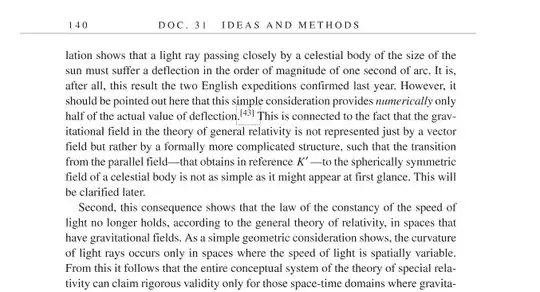The LIGO Scientific Collaboration and Virgo Collaboration have announced that on the 14th of September 2015, at 09:50:45 UTC, they detected a transient Einstein gravitational wave, designated GW150914, produced by two merging black holes forming a single black hole. They stated that the speed of propagation of the gravitational wave is the speed of light. Is the speed of propagation of Einstein's gravitational waves unique or arbitrary?
4 Answers
On top of John Rennie's answer:
Summary: Nothing propagates faster than the speed of light according to GR. According to general relativity, gravitational waves propagate at the speed of light. From what I understand, this applies even when adding corrections to the weak field limit, although then the question becomes how to decompose the curvature into two parts (background + gravitational waves).
Why LIGO people are interested: If one believes in gravitons and GR, measuring the speed of gravitational waves offers a way to constrain general relativity.
- 888
Just to add to the other answers - the non-linear theory predicts that gravitational waves propagate isotropically in vacuum with speed $c$, as in the linear theory (see here for a mathematical answer, also you can find this in Hawking & Ellis). In other words, the causal domain for events related through gravitational radiation is identical to the causal domain of electromagnetic radiation (light cone), though this is seldom discussed in physics GR books for reasons I don't understand.
It is a really amazing property of general relativity that this is true - the non-linear nature of the field equations could easily have meant that waves (solitons) behave topologically non-trivially. In modified theories of gravity, with field equations even infinitesimally different from GR, gravitational waves can acquire massive modes which modifies the dispersion relations and tweaks the phase speed (see here for linear and here for non-linear in one such theory, at the risk of self-promotion). Therefore, one such test of GR is to try and find GWs with propagation speeds different from $c$.
- 1,555
A partial answer: the analytical approach to gravitational waves normally uses the weak field limit of the Einstein equations. In this limit it's easy show that the wave vector of the gravitational wave is null i.e. it travels at the speed of light (proof available on demand but it's not terribly interesting). More precisely the local speed of propagation is always $c$.
I say this is a partial answer because I'm not sure what happens when the gravitational waves are intense enough for the non-linearities to become important. While this is never going to be an issue for the waves detected by LIGO it would be important very near to the colliding black holes.
- 367,598
Is the speed of propagation of Einstein's gravitational waves unique?
No. As per all waves, the speed varies according to the properties of the medium. Moreover a gravitational wave is a propagating transient change in the properties of the medium, space, such that optical clocks run slower whilst the wave is passing through. Do note that the speed of a wave also depends on the type of wave. For example seismic waves might be longitudinal P-waves or transverse S-waves. The latter propagate at circa 60% of the speed of the former.
The LIGO Scientific Collaboration and Virgo Collaboration have announced that on the 14th of September 2015, at 09:50:45 UTC, they detected a transient Einstein gravitational wave, designated GW150914, produced by two merging black holes forming a single black hole. They stated that the speed of propagation of the gravitational wave is the speed of light. Is the speed of propagation of Einstein's gravitational waves unique or arbitrary?
It varies, as does the speed of light:
None of the answers others have given to this question are correct. The speed of propagation of Einstein's 'gravitational waves' is arbitrary because it is coordinate dependent.
IMHO you should employ the CMB reference frame here. When you do, you will still find that the speed of a gravitational wave varies. It goes slower when it passes through a region of low gravitational potential, such as a galaxy.
There is no unique speed of propagation. Select a certain set of coordinates then the speed is that of light.
We can't be totally confident that the speed of gravitational waves is the speed of light. I know that's what Einstein said, but the proof is in the pudding, and I'm not totally convinced about the LIGO result.
Select a different set of coordinates then the speed is entirely different to that of light. The claim by the LIGO-Virgo Collaboration that the speed of propagation is the speed of light is patently false.
I don't think it's patently false, in that they had two waveforms at two locations, with a delay that was in line with propagation at c.
Furthermore, General Relativity cannot localise its 'gravitational energy'.
It can. The energy density of space where a gravitational field is, is higher than the energy density of free space.
Consequently there are no 'gravitational waves'.
A wave is a propagating field variation, or a field is a standing wave. If you can have a field, you can have a wave.
Indeed, General Relativity violates the usual conservation of energy and momentum for a closed system and is thereby in conflict with a vast array of experiments.
It doesn't violate conservation of energy. The ascending photon doesn't lose any energy. The descending brick doesn't gain any.
As for the mathematical theory of black holes, it violates the rules of pure mathematics. It is therefore false. LIGO did not detect gravitational waves or black holes. All this has been explained in detail in my paper here: Crothers, S.J., A Critical Analysis of LIGO's Recent Detection of Gravitational Waves Caused by Merging Black Holes, Hadronic Journal, Vol. 39, 2016, http://vixra.org/abs/1603.0127
I'll take a look at it. As I've said before, I think you should reserve your accusations for the incorrect interpretation of GR rather than GR itself.
- 11,381
